Key takeaways
- Feminist ethics emphasizes the significance of relationships, care, and diverse perspectives, challenging traditional morality that often overlooks marginalized voices.
- Incorporating feminist ethics in philosophy education enhances relevance by connecting moral discussions to real-world experiences and promoting empathy.
- Practical steps to apply feminist ethics daily include active listening, reflecting on power dynamics in interactions, and integrating care into self-talk and relationships.
- Challenges in practicing feminist ethics involve emotional overwhelm, confronting biases, and maintaining ethical integrity in environments lacking support for these values.
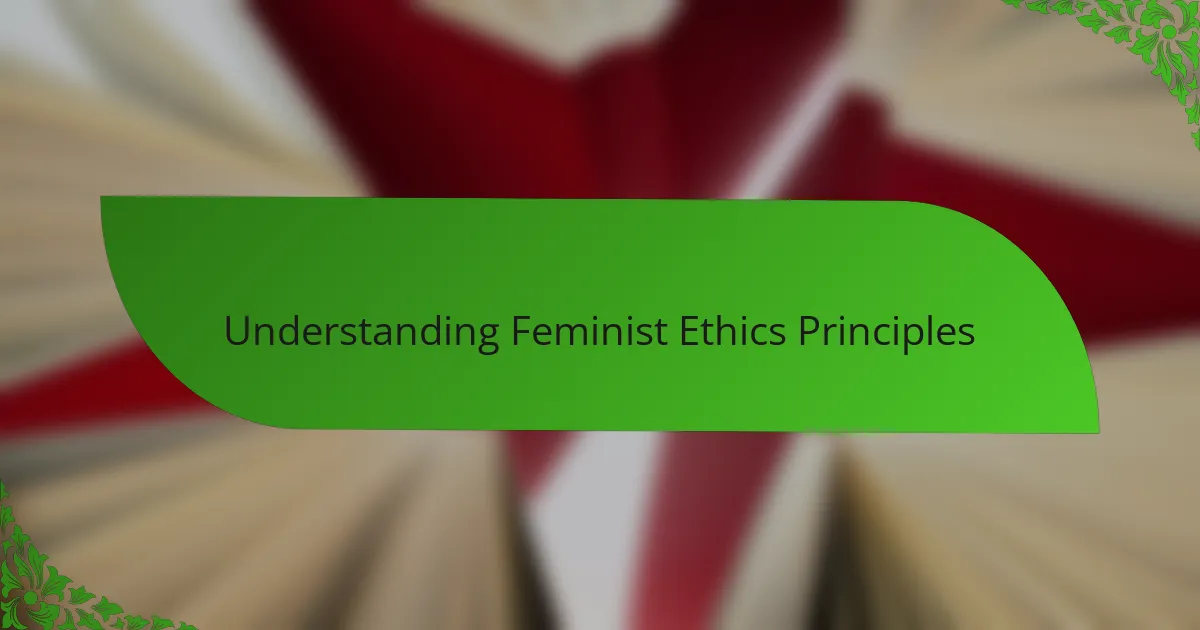
Understanding Feminist Ethics Principles
When I first encountered feminist ethics, what struck me most was its focus on relationships and care rather than abstract rules. It made me question: why do traditional ethical theories often ignore the lived experiences and voices of many, especially women? This shift towards empathy and connection felt refreshingly human to me.
Feminist ethics challenges the idea that morality is one-size-fits-all by highlighting the importance of context and the complexities of power dynamics. Reflecting on my own interactions, I realized how often I had overlooked the subtle ways inequality played out in everyday life. Recognizing this opened a door to deeper understanding and more compassionate responses.
What I appreciate even more is how feminist ethics emphasizes listening and valuing diverse perspectives. It’s not just a theory but a call to be more aware and responsive in my daily choices. This principle has made me rethink how I engage with others, encouraging me to prioritize care alongside justice.
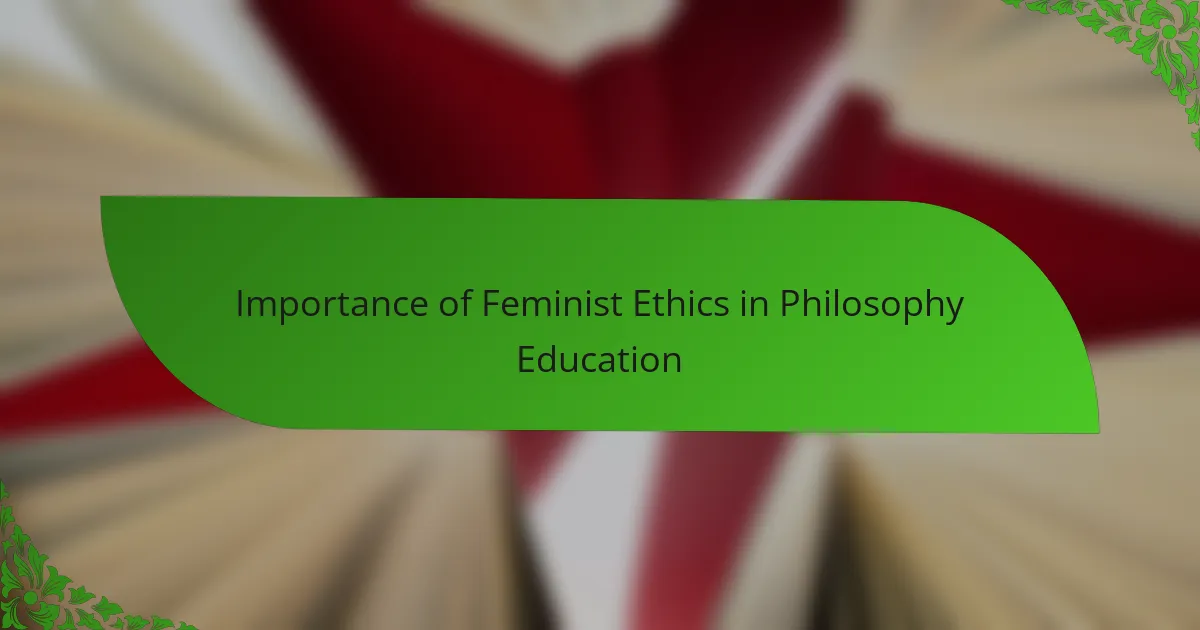
Importance of Feminist Ethics in Philosophy Education
Feminist ethics holds a crucial place in philosophy education because it pushes us to reconsider whose voices are included in moral discussions. I remember feeling challenged when I realized how often traditional philosophy seemed detached from real-world experiences, especially those of marginalized groups. Doesn’t ethics lose its meaning if it only speaks to a narrow segment of humanity?
In my teaching and learning journey, embracing feminist ethics made me see philosophy not just as abstract thinking but as a living dialogue that demands attentiveness to context and power relations. This perspective enriches philosophical inquiry by grounding it in everyday realities, making the subject more relevant and impactful.
Most importantly, feminist ethics in education invites us to practice empathy and care, qualities I believe are vital for anyone striving to lead an ethical life. Have you noticed how much more meaningful ethical reflection becomes when it’s linked to genuine concern for others? That connection is something feminist ethics uniquely brings to the table.
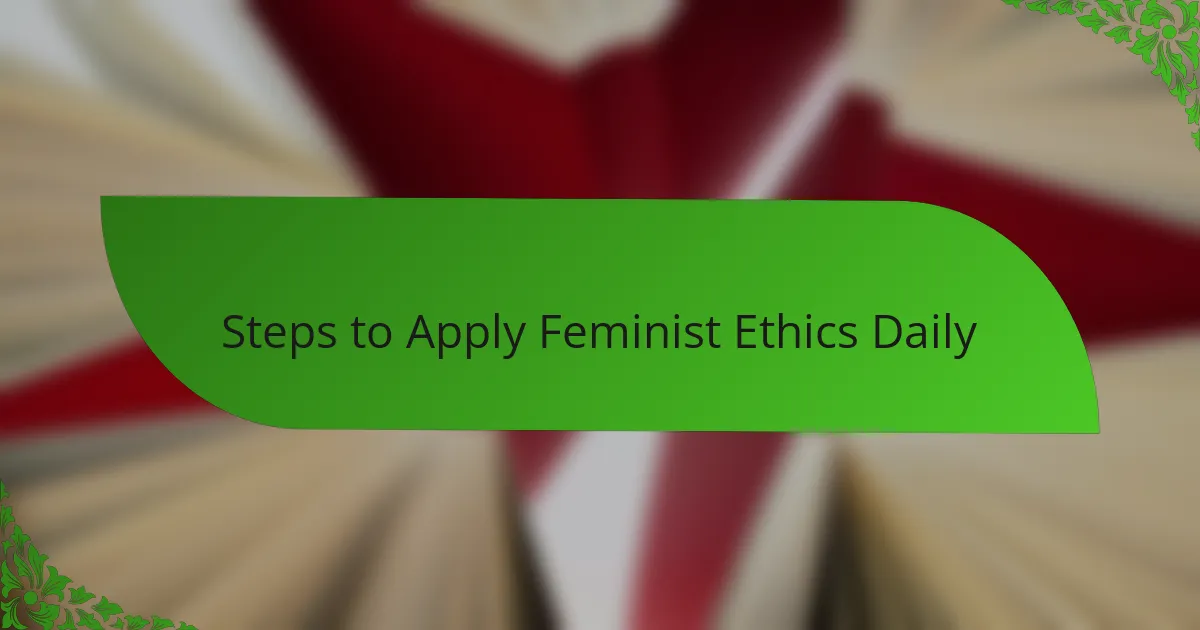
Steps to Apply Feminist Ethics Daily
One simple step I took was to start listening more attentively—to the experiences of people around me, especially those whose voices were often overlooked. Have you ever noticed how easy it is to fall into patterns of judgment without truly understanding someone’s context? By pausing and tuning in, I found that ethical considerations became less abstract and more grounded in real human connection.
Another practical move was to reflect daily on how my actions either upheld or challenged existing power imbalances. For instance, when making decisions at work or in social settings, I asked myself: Am I nurturing relationships or unintentionally reinforcing hierarchies? This habit helped me become more conscious and intentional about promoting care and equity in even the smallest moments.
Lastly, I made a commitment to integrate care into my self-talk and interactions, recognizing that justice isn’t just about fairness but also about empathy. It wasn’t always easy—sometimes I caught myself falling back into old habits of detachment—but each day offered a fresh chance to practice kindness and responsiveness. Don’t you find that when you treat yourself and others with care, ethical living becomes a more meaningful and sustainable pursuit?
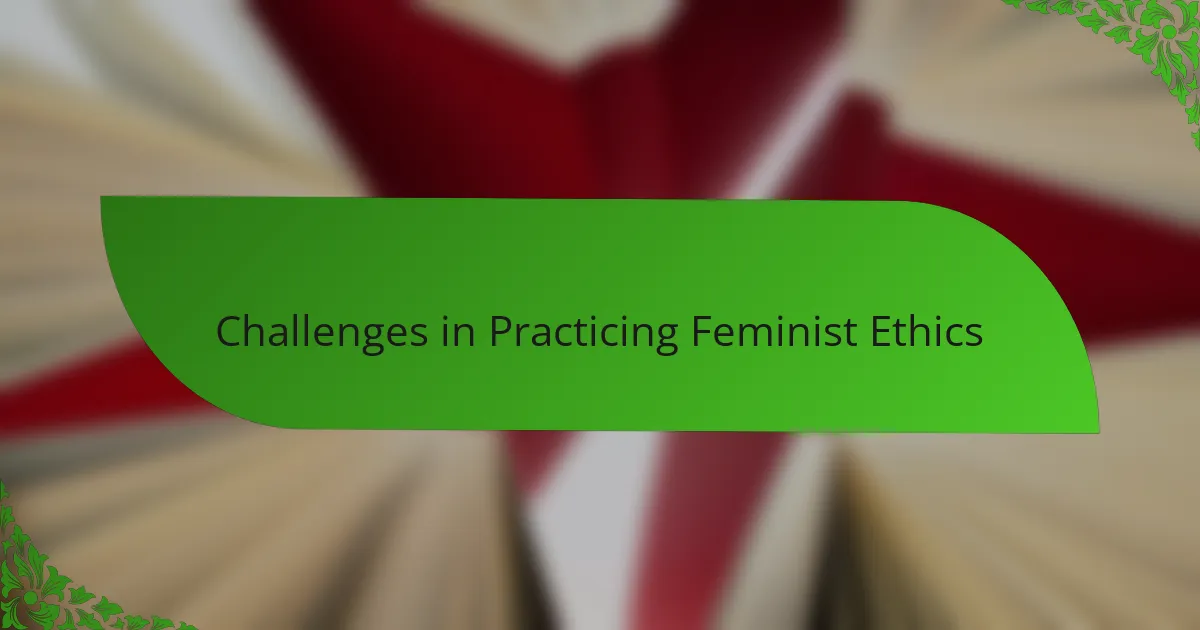
Challenges in Practicing Feminist Ethics
Practicing feminist ethics hasn’t been without its hurdles for me. Sometimes, I struggle with the tension between wanting to care deeply and the risk of becoming emotionally overwhelmed. Have you ever felt that empathy can be exhausting, especially when faced with persistent injustices? It’s a challenge to find balance without losing motivation.
Another difficulty lies in confronting ingrained social norms and my own unconscious biases. I often catch myself slipping back into old patterns—judging too quickly or overlooking voices that deserve attention. It takes constant self-reflection, and I have to admit, that process can be uncomfortable, even humbling.
I also noticed that applying feminist ethics in group or professional settings can feel isolating. Not everyone shares the same commitment to these values, which sometimes leads to resistance or misunderstanding. How do you maintain your ethical integrity when the environment doesn’t fully support it? For me, it’s about holding on to the core principles while finding small ways to influence change.
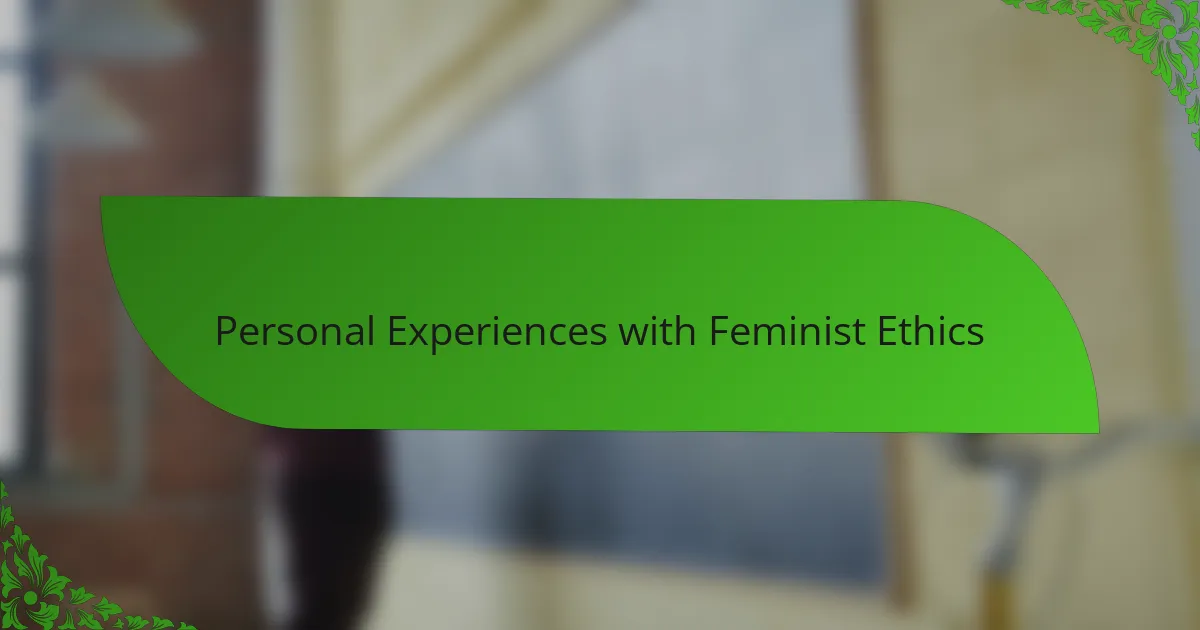
Personal Experiences with Feminist Ethics
There was a moment when I realized feminist ethics wasn’t just academic theory but a lens that reshaped my everyday relationships. I remember a heated conversation with a close friend where, instead of rushing to judgment, I paused to listen deeply—acknowledging her experience rather than fixing the problem. That simple act of care shifted the whole dynamic and made me see how transformative this approach could be.
Sometimes, I catch myself wrestling with the tension feminist ethics highlights—wanting to act justly while also nurturing compassion without burning out. Have you ever felt that push and pull between standing firm on principles and staying emotionally present? Navigating this balance has been a deeply personal journey, full of trial, error, and small victories.
What surprises me most is how feminist ethics continuously invites me to reconsider my assumptions about power and privilege in subtle ways. For example, I’ve become more mindful in group settings, noticing whose voices get heard and actively making space for those often sidelined. It’s an ongoing practice that keeps me humble and hopeful about creating more equitable connections.
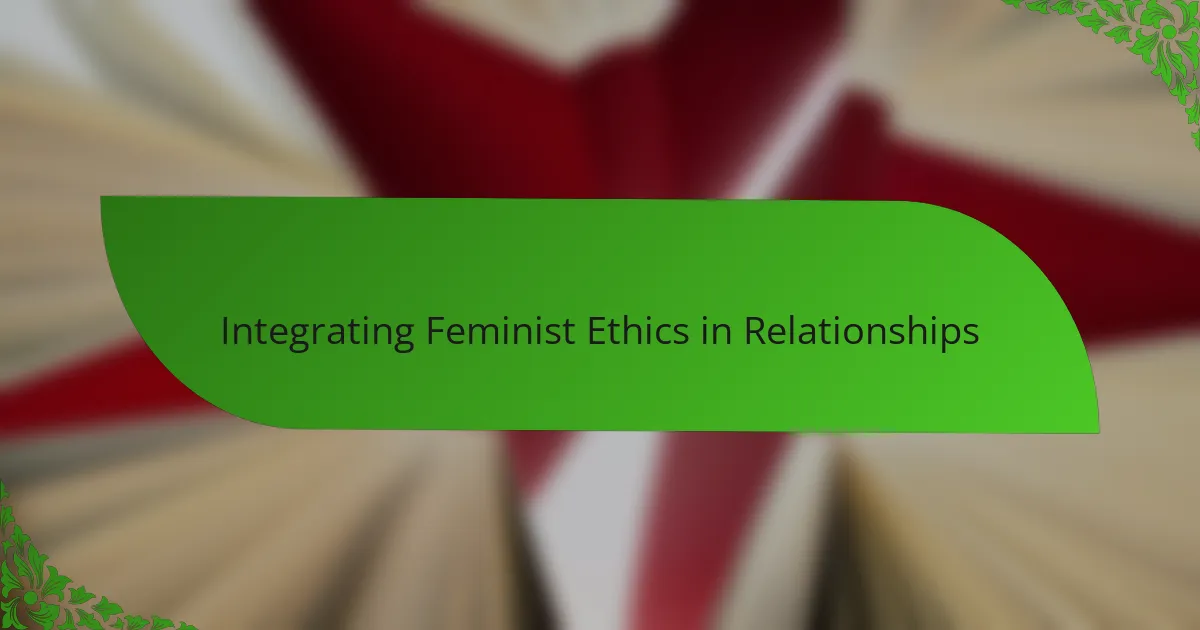
Integrating Feminist Ethics in Relationships
When I started applying feminist ethics to my relationships, I realized it wasn’t just about fairness but about truly valuing the other person’s experience. Have you ever noticed how often we listen just to respond, rather than to understand? Shifting to a mindset of care changed how I communicate, making conversations feel more open and less defensive.
Navigating power dynamics with friends or partners became a crucial part of this practice. I found myself asking, “Am I creating space for their voice, or am I unintentionally dominating the dialogue?” This simple question reminded me to be more mindful and compassionate, fostering a sense of mutual respect rather than control.
But integrating these principles isn’t always easy. There were times when being attentive to others’ needs made me feel stretched thin emotionally. Still, I’ve learned that prioritizing care doesn’t mean losing myself—it’s about building connections that nurture both sides, making relationships more genuine and resilient.